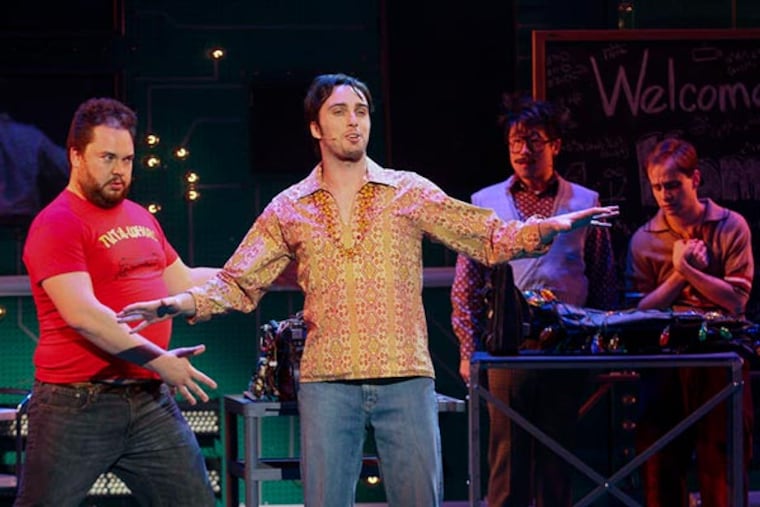Title aside, 'Nerds' has it all
Try to ignore this show's title, and the kind of frat-house-humor implications that come with it. Visually hot and musically adept, the show that Philadelphia Theatre Company unveiled Wednesday about Steve Jobs and Bill Gates certainly concerns the geeky monomaniacs referred to in the title Nerds, but it has infinitely more class, insight, and wit than the pop-culture "nerd subgenre" of the 1980s.

Try to ignore this show's title, and the kind of frat-house-humor implications that come with it.
Visually hot and musically adept, the show that Philadelphia Theatre Company unveiled Wednesday about Steve Jobs and Bill Gates certainly concerns the geeky monomaniacs referred to in the title Nerds, but it has infinitely more class, insight, and wit than the pop-culture "nerd subgenre" of the 1980s.
With surgical precision (something like How to Succeed in Business meets Urinetown), Nerds portrays Silicon Valley's confluence of hippie socialism and rampant capitalism, nailing such underlying themes as the cost of dreams, the emptiness of revenge, and the itch that lies behind John D. Rockefeller's old saying that enough money is always "just a little bit more."
Though Act II loses its nerve as it strains to achieve a pat emotional resolution, Nerds is well on its way to being one of those generation-defining shows. The ultra-tight Act I has one knockout, high-velocity musical number after another, performed by a cast that can do anything.
The touch is light: Hal Goldberg's music descended from William Finn, Frank Loesser, and nonabrasive rap. The laugh-out-loud humor of the Jordan Allen-Dutton/Erik Weiner lyrics is a dramatically sturdy by-product of keen characterizations - in a story that shows both characters from their 1970s beginnings, Gates having dropped out of Harvard ("It's too easy") and Jobs having drug-fueled rock-star delusions of messiah-hood.
As Jobs and Gates rise, you realize that nerds don't do well with fame and power: Having been at the mercy of childhood bullies, their ambition comes from hollow places. Gates sits on his corporate throne, gaining moral support from his hamster. With his rock-star grandiosity, Jobs envisions his influence in the production number "Think Different" with cameos by Albert Einstein and Mother Teresa.
Matt Bradley couldn't be better at conveying Jobs' delusional sexiness, though his sidekick Steve Wozniak, well acted by Benny Elledge, could use a bit more stage time. Stanley Bahorek inhabits the soul of seething inhibition as Gates, while Rob Morrison as his sidekick enjoys playing both his character and the android version of it in Act II. Kevin Pariseau walks off with much of the first act, playing a maliciously charismatic IBM exec.
The leading women have the less-flamboyant task of anchoring the story in some sort of emotional normality. Kudos to Briana Carlson-Goodman and Lexy Fridell for doing it so well.
The high-tech Lee Savage set has the capability to dazzle with something like 15 video monitors of various sizes and shapes that are given a workout with all manner of imagery. But the beauty of it is how determinedly director Casey Hushion makes it stick to the story, with a nice coup de theatre when Jobs buys his way into Heaven with an Apple Store gift card. The jokey Joshua Bergasse choreography underscores the satire in all the right ways, since this is not some CNN musical, but a parable that's larger than the sum of its plot.
But it's a parable that had to wait until its time had come. When Nerds was first seen at PTC six years ago, the stories of Jobs and Gates weren't a closed book. Their respective transitions - Gates into philanthropy and Jobs into the hereafter - needed to decisively settle in before this story could be told with the irreverent freedom (and New York production money) it now enjoys. As it stands, this show may well maintain relevance long after iPads are outdated.
Nerds
Through Dec. 29 at the Suzanne Roberts Theatre, 480 S. Broad St.
Tickets: $51-$79.
Information: 215-985-0420 or www.PhiladelphiaTheatreCompany.org.
EndText